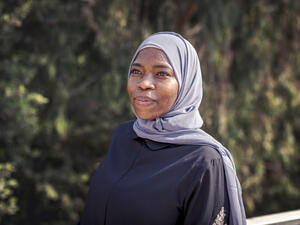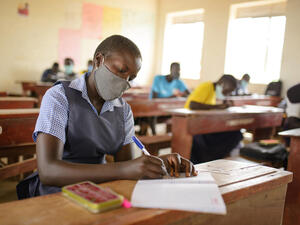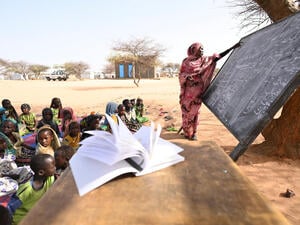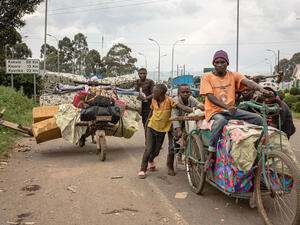Refugee professionals serving the community in Namibia
Refugee professionals serving the community in Namibia

Refugee Olivier Lino, who fled civil war in his native Angola almost 15 years go, now serves as a chief prosecutor in northern Namibia.
OSIRE, Namibia, November 22 (UNHCR) - When Victoire Mpelo fled his native Democratic Republic of the Congo, practising medicine again was probably one of the last things on his mind. Yet, some 10 years later, the doctor is kept busy every day, looking after fellow refugees in Namibia's Osire settlement.
Meanwhile, the nearby Osire Secondary School, headed by another refugee, Come Niyongabo from Burundi, is ranked among the top secondary education establishments in the country. When it comes to social services, the refugees in Namibia's dusty Osire settlement are almost completely self-sufficient.
The Namibian government, to its credit, decided two years ago that it should tap the expertise of the 8,000 refugees living in Osire rather than rely on government employees or others to provide basic services in the camp and surrounding area.
"In most African countries, financial support from UNHCR is required to provide the basic services in the refugee camps and this is usually done through NGOs or the health, education or other relevant ministries, but with funding provided by UNHCR," said Lawrence Mgbangson, UNHCR's representative in Windhoek. "Namibia is quite unique in that it recognizes its responsibility and is taking steps to ensure that skilled refugees are hired," he added.
Professionals like Mpelo and Niyongabo are now paid by the government, receiving the same salaries as civil servants. They are also included in training programmes. The only difference is that they do not receive a housing allowance.
Mpelo is delighted to be working again and the daily queue outside his clinic shows that he is kept busy. He made his way to Zambia and then Namibia from the Fizi region of Congo's South Kivu province to escape conflict, and after being repeatedly harassed because of his ethnic origin.
UNHCR helped Mpelo get his medical certificates translated and recognized by the relevant health boards in Namibia, making him eligible to practise. He jumped at the chance when asked to work in the Osire clinic.
"Having a doctor based in Osire, has made a tremendous impact," said Ester Namwandi, a senior regional health official who added that having Mpelo on the ground allowed for a quicker response to emergencies. "If he wasn't there, critical cases would have to be transported to Otjiwarango hospital, over an hour-and-a-half away, and sometimes there just isn't enough time."
Some of the nurses, such as Anna Chica Julia Ricardo, are also refugees. The Angolan has been living in Osire since 1994 and was hired by the Red Cross to help in the clinic. But, since 2008, she has been an employee of the Ministry of Health. "This was not my plan . . . I guess I was just needed," she said.
Down the road, more than 1,700 children, including around 100 Namibians from the host community, study at Osire's primary school. The headmaster, Carlos Sukuakueche, fled his native Angola in 1994. His counterpart at the neighbouring secondary school, the Burundian Niyongabo, came to Namibia in 1996.
Here he has a chance to create something positive and to help young people establish a platform for a fruitful future. The results are startling. Last year, Osire students' exam results were among the top 13 per cent in the whole country.
"I am proud of the record of this school and how well our students have done," Niyongabo told UNHCR. He said a new challenge would be to get funding and scholarships to send some of them to university. "It pains me to see some of my brightest students still in the settlement, unable to go further due to lack of opportunities for higher education."
At least one refugee is even helping to administer justice in Namibia. At Otjiwarango magistrate's court, Chief Prosecutor Olivier Lino warmly greets visitors. He made his way to the top after winning a scholarship - through UNHCR's German-funded Albert Einstein German Academic Refugee Initiative - to study law at the University of Namibia.
He graduated in the top five of his class and pushed hard to work in the public sector. "Having been discriminated against because I was from a minority in Angola - and then the experience of being a refugee - made me want to become a lawyer who defends human rights," Lino explained. "I serve everyone - Namibians and others who need justice."
UNHCR's Mgbangson, meanwhile, is inspired by Osire. "The experience in Namibia can be an example to the world on how refugees can contribute to their host society. It not only enhances the refugees in terms of socio-economic capacity, but also assists in the peaceful co-existence endeavours with their host counterparts," he said.
By Tina Ghelli in Osire, Namibia








